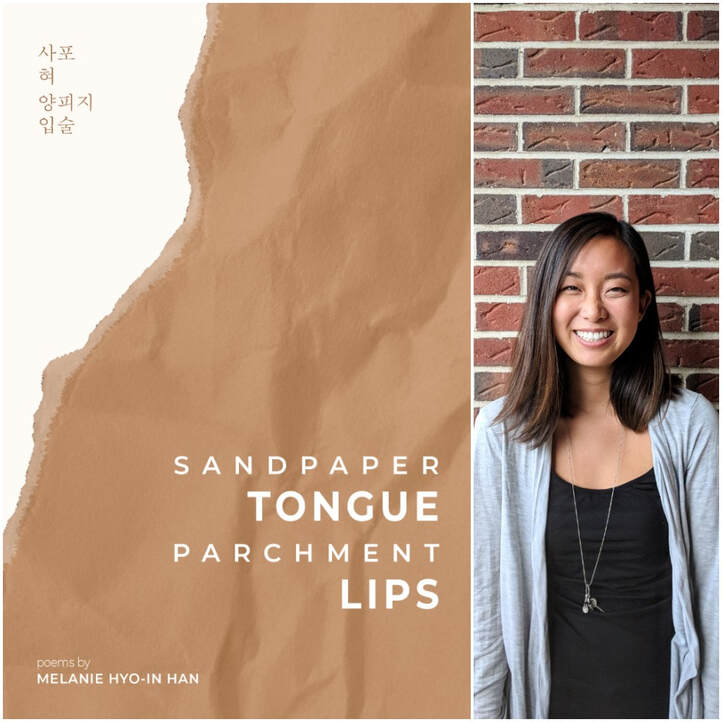|
Of Melanie's forthcoming collection, Sandpaper Tongue, Parchment Lips, Rajiv Mohabir writes: "Melanie Hyo-In Han asks what it means to be an outsider to both language and place while returning the reader-cum-witness to the house of poetry... The migrating body thrives in rainy seasons, in heartbreak, in alienation, all while baring the intimacy of presence and poetic line. And Livia Meneghin adds that: "each poem offers an invitation to explore family and place with an elegant assuredness, a tender guide. Sandpaper Tongue, Parchment Lips not only asks, “Can I Roll, Slice, Stack Memories?” but also, “at what cost?” We spoke with Melanie recently about her forthcoming collection of poems, which can be preordered from Finishing Line Press. AHC: Can you tell us a little bit about your upcoming book, Sandpaper Tongue, Parchment Lips? Melanie: Sandpaper Tongue, Parchment Lips, is a collection of poetry based on my experiences as a TCK (Third Culture Kid) growing up in East Africa and facing struggles around identity and racism, as well as cultural and linguistic barriers between me and my Korean family. Throughout my childhood, I had to come to terms with who I was as I dealt with deaths, drought, bullying. The chapbook focuses on heartbreaking events and sad memories, but also joyful moments that have shaped me into who I am today. AHC: Your book, in part, is a tying together of experiences in different cultures, languages, homes. In migration: a kind of heartbreak. Are there any poets in particular who've been an inspiration to you in writing through similar terrain and experiences? Or poets who, when coupled together, seem to speak through their differences into a kind of universal flow? Which poets do you find and return to in your toolbox? Melanie: There are three poets that come to mind, each who address topics that I deal with in my chapbook in their own, very different ways: Sara Borjas, author of Heart Like a Window, Mouth Like a Cliff, is a Chicana poet who struggles with cultural assimilation and what it means to think about her Mexicanness in the context of living in the U.S. In Thrown in the Throat by Benjamin Garcia, the author talks about the complexities of language, identity, and culture. Last but not least, Philip Metres writes a lot about the concept of "home" and how that plays out in the midst of war and tragedy. I find myself reading through the works of these three poets often, especially because they give me inspiration to continue thinking through my own identity, culture, and what "home" means. AHC: What comes to mind when you think of home? What's the ineffable you aim for in a poem, but that perhaps, inevitably, some part of the poem must miss? Melanie: "Home" to me has never been a location, though, in some ways, I really want it to be a single place that I can pinpoint on a map. I think "home" has become an idea that is abstract, rooted in people and memories rather than a specific location. In my poetry, I hope to give readers the sense of belonging and a feeling of hope, similar to an emotion one might feel at "home," but through words and experiences rather than a concrete place. AHC: How did you first come to poetry, or, perhaps more aptly: how did poetry first find you? Melanie: Poetry first found me when I was lonely and I didn't have ways to really express how I was feeling to others. Through fragments of words and images, writing became one way I could reflect on my emotions, which eventually turned into more developed pieces that I could turn into poems. AHC: What are a few of your favorite poems? Perhaps poems many don't know of, but should? Melanie: Honestly, I love every poem written by Emily Jungmin Yoon, a poet whose main area of focus is inherited trauma in Korean women, as well as gender, race, and history. I'd highly recommend Ordinary Misfortunes and News for anyone who wants a taste of her poetry. AHC: How do you know when a poem is done? What makes it click? Melanie: I don't think a poem is ever really done! There are poems I wrote 5 years ago that I still return to and make small edits, perhaps add in a line break here and there or put in an additional punctuation mark. However, I do feel like it's ready-ish to share with the world once I've written it, revised it (lots and lots of times), left it alone for a bit, and then made a few more edits. AHC: Do you have any words of advice for other poets, perhaps most especially those starting out, still searching for their voice and that sweet spot in a poem? What words of advice from others have helped you along your journey? Melanie: My one piece of advice would be to "never be afraid of experimenting." Whether it's experimentation through form, images, concepts, etc. I think there's so much creativity within each person that is just waiting to come alive but might be held back by what we are taught as "traditional poetry." Writing is a form of expression, so I think I would encourage people to just write and see where it goes! Sandpaper Tongue, Parchment Lips is available from Finishing Line Press. Comments are closed.
|
AuthorWrite something about yourself. No need to be fancy, just an overview. Archives
April 2024
Categories |

 RSS Feed
RSS Feed
